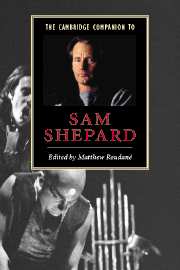Book contents
- Frontmatter
- Introduction
- 1 Born injured
- 2 Shepard and Off-Off-Broadway
- 3 Shepard on Shepard
- 4 A note on Sam Shepard
- 5 Joseph Chaikin and Sam Shepard in collaboration
- 6 Repetition and regression in Curse of the Starving Class and Buried Child
- 7 Shepard writes about writing
- 8 Reflections of the past in True West and A Lie of the Mind
- 9 Patriarchal pathology from The Holy Ghostly to Silent Tongue
- 10 The classic Western and Sam Shepard’s family sagas
- 11 European textures
- 12 Sam Shepard and the cinema
- 13 Sam Shepard as musical experimenter
- 14 Sam Shepard’s nondramatic works
- 15 States of Shock, Simpatico, and Eyes for Consuela
- 16 Sam Shepard’s The Late Henry Moss
- 17 Sam Shepard
- Select bibliography
- Index
5 - Joseph Chaikin and Sam Shepard in collaboration
Published online by Cambridge University Press: 28 May 2006
- Frontmatter
- Introduction
- 1 Born injured
- 2 Shepard and Off-Off-Broadway
- 3 Shepard on Shepard
- 4 A note on Sam Shepard
- 5 Joseph Chaikin and Sam Shepard in collaboration
- 6 Repetition and regression in Curse of the Starving Class and Buried Child
- 7 Shepard writes about writing
- 8 Reflections of the past in True West and A Lie of the Mind
- 9 Patriarchal pathology from The Holy Ghostly to Silent Tongue
- 10 The classic Western and Sam Shepard’s family sagas
- 11 European textures
- 12 Sam Shepard and the cinema
- 13 Sam Shepard as musical experimenter
- 14 Sam Shepard’s nondramatic works
- 15 States of Shock, Simpatico, and Eyes for Consuela
- 16 Sam Shepard’s The Late Henry Moss
- 17 Sam Shepard
- Select bibliography
- Index
Summary
“I’m all these words, all these strangers . . .”
samuel beckett, The UnnamableThe performer's voice is shallow, unable to save the energy needed to qualify sentences after they have been spoken. Each utterance sounds ultimate, even when the words themselves are tempered by his humor or reasonableness, or by his obvious exhaustion after finishing a line. An egotistical actor would indicate triumph over his condition; a maudlin one, shame. Here, the man's voice may reach the limits of his language and then withdraw, but his face continues speaking - of the desire to speak with more precision, and of the knowledge that even if he succeeds, he won't shake his compulsion for making sentences.
There are in fact few sentences in his text, The War in Heaven, an enthralling collaboration between Sam Shepard and its performer, Joseph Chaikin, begun in February 1984 but not completed until after a stroke in May left Chaikin aphasic. By the time they resumed work, Chaikin had recovered some of his ability to speak; but as a writer he was limited by a severely depleted vocabulary, and as an actor by his inability to memorize. His character, an angel who “died/the day [he] was born,” crashing to earth and “here/by mistake,” testifies about his condition in abrupt phrases, many of which shatter in performance as Chaikin works to sustain his interpretation. The shivered words mark the turns in a second, shadow narrative that transforms the angel’s story of his exile from heaven into a parable of memory and language – Chaikin’s own exile from the Eden where everything has its name and speech grants life. Chaikin and Shepard dramatize two interdependent losses of faith – one in what the angel calls “a lawful order . . . that was clear to me” (139); the other – more painful – in the survival of a language strong enough to depict and then protest such a loss.
- Type
- Chapter
- Information
- The Cambridge Companion to Sam Shepard , pp. 83 - 110Publisher: Cambridge University PressPrint publication year: 2002



